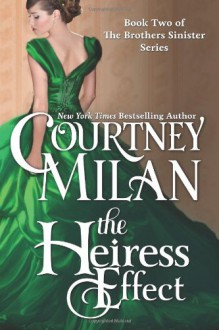
I started reading this book at 2:00 AM while nursing my son, and I couldn't put it down in order to go back to bed. It was a really uncomfortable read, in some ways, but by the time I reached the end, I loved this book. I need some time to reflect on it to be sure, but right now I think it might even displace Unraveled as my favorite Courtney Milan story.
This is an opposites attract story, but not the kind where the hero and heroine are at each other's throats before they suddenly fall into bed together. Jane Fairchild is a social misfit--by design. She knows her immense fortune makes her attractive to suitors, but she is determined not to marry until her epileptic younger sister comes of age and can leave the clutches of her misguided guardian, who allows quack doctors to perform heinous and painful "treatments" on the girl in hopes of curing her convulsions. If she married, Jane could no longer be with her sister, and more importantly, she would no longer control her own fortune (as a husband controls his bride's property in Victorian England), and Jane relies on that money to bribe doctors to leave her sister alone. Therefore, she staves off would-be-suitors by being deliberately gauche: her clothing is obscenely gaudy, her manners are atrocious, her voice is too loud.
Oliver Marshall, by contrast, is the bastard son of the former Duke of Clermont (his origins are explained in the novella The Governess Affair, which I also recommend). Although raised in a loving, secure family of his mother, adoptive father, and younger siblings, Oliver has grown into an insecure adult, too conscious that his illegitimacy means he will never fit in the social circles to which he aspires. He wants to be the Prime Minister someday, so his behaviour is as proper as Jane's is crude. He is attracted to Jane immediately, but he cannot act on the attraction because she would make a terrible wife for a man of his ambitions.
The plot of this novel was not as tight as Ms. Milan's previous novels, but that made this story less predictible. There were times when the odds against the couple seemed insurmountable, and the dramatic tension was strong enough to actually give me a stomach ache. (I told you this was an uncomfortable read.) Several of my favorite scenes actually had very little to do with the main plot and might have been left on the cutting room floor in a more rigidly-crafted novel: there is an early scene wherein Oliver goes fishing with his father which was just delightful--funny, emotional, and so full of insight into Oliver's family dynamic; a similar scene in which Oliver goes to rescue his youngest sister (a budding suffragette) from a rowdy political rally only to have her shame him into staying;and a scene between Jane's sister and her paramour, a law student, in which they are puzzling over the arcane property law precept, the Rule Against Perpetuities, just as every law student has since the dawn of time (myself included). On the other hand, sometimes the plot moves at a whirlwind pace and the reader just has to roll her eyes and hang on tight.
I love that Jane and Oliver are both sympathetic, moral people trying to hold on to their principles while doing what's best for others, even if doing what's right means they can't be together. Jane can't let herself be swept away by love, because doing so would leave her sister unprotected. Even when her sister's situation is happily resolved, Jane isn't willing to sell herself short by becoming the meek, mannerly "wren" of woman Oliver thinks he needs. Oliver's desire for a proper wife is fueled by his political ambition, yes, but he is not ambitious for his own sake: he is driven by the injustice inherent in the fact that the best, most ethical man he knows, his father, can't vote because he doesn't own property. Because Oliver identifies the cause with his father, he sees anything that hurts his chances for political success--including an alliance with Jane--as a betrayal of the man who gave up his own ambitions to raise a boy who was not even his own son. Often times, the barriers that keep lovers apart in romance novels seem contrived or overblown, but this conflict feel real and heartrending, and I loved the way it finally resolved.

 Log in with Facebook
Log in with Facebook 









